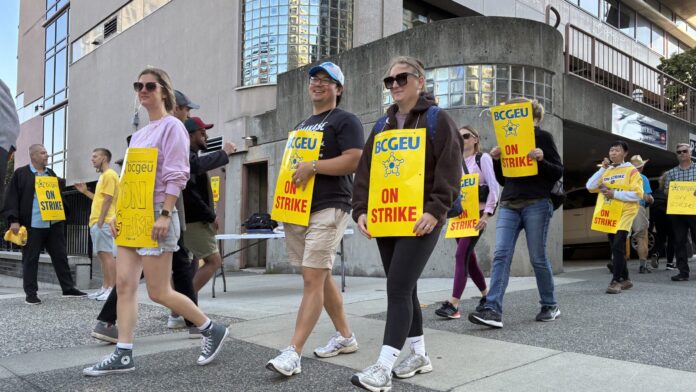The union representing thousands of public service workers in British Columbia is ramping up job action again, this time affecting front-line services.
The B.C. General Employees Union (BCGEU) said Thursday members at the Ministry of Citizens’ Services are joining the picket lines in Victoria.
It said there could be delays or disruptions to services such as issuing B.C. Services Cards and processing freedom-of-information requests.
The members also maintain provincial information technology systems and facilitate B.C. Bids, a platform where public sector organizations advertise contract opportunities.
Workers at the province’s Gaming Policy and Enforcement Branch are also on strike.
They regulate the province’s gaming industry, including oversight of the B.C. Lottery Corporation.
BCGEU said the strike could disrupt gambling service providers and slow a significant provincial revenue stream.
Staff at the Royal B.C. Museum in Victoria have also been on strike for weeks, however the museum has largely remained open to visitors.
“Until now, our job action has primarily targeted core government operations, with the exception of the Royal BC Museum,” said BCGEU President Paul Finch in a statement. “But the government’s refusal to return to the table with a fair wage offer leaves us no choice but to escalate. We are now expanding job action to sites that are essential to both the public and businesses—a step we had hoped to avoid.”
It is the third week of the BCGEU’s escalating strike, and the union said more than 8,500 have taken job action so far, whether by joining picket lines or other actions like overtime bans.
The BCGEU represents 34,000 public service workers, ranging from wildland firefighters to social workers.
The Labour Relations Board sets minimum levels of service that must be maintained during the strike, based on what services are deemed essential for public health, safety and welfare. That still leaves a range of ministries and services open to job action.
Earlier this week, public service workers supporting the mining sector joined picket lines in Vancouver and Cranbrook.
There is a concurrent strike by the Professional Employees Association, which represents government-licensed professionals. Its members with the BC Ministry of Mining and Critical Minerals also walked off the job this week.
The BCGEU wants the province to return to the table with a deal that includes larger wage increases, fair access to telework and a reduction in non-union managerial roles.
The union tabled a proposal in June for an 8.25 per cent wage increase over the two-year deal.
“The government’s current offer of 3.5 per cent over two years falls short of inflation projections for B.C. over the same period,” said Finch. “Wages in B.C. are up 40.6 per cent since 2016, but public service workers have only seen a 27.2 per cent increase.”
B.C.’s first quarterly budget update for the year, released on Monday, forecast a $11.6 billion dollar deficit this year. The deficit is expected to climb $12.6 billion next year and $12.3 billion the following year.
But Finch disputes the idea that B.C. is facing a fiscal crisis.
“Our debt-to-GDP ratio is among the lowest in the country, and debt servicing costs are manageable. None of this is a barrier to paying public service workers a fair wage,” he said.
Premier David Eby has promised to rein in administrative spending across the public sector. The province launched a review of health care spending earlier this year.
Eby said Tuesday his government has reduced the public service by about 850 full-time equivalents.
Speaking to reporters during a trip to Ottawa Thursday, Eby suggested more cuts are expected.
“We are cutting waste, from across the system, making sure that resources going into administration or management are not taking away from those front line services for British Columbians,” said Eby.






